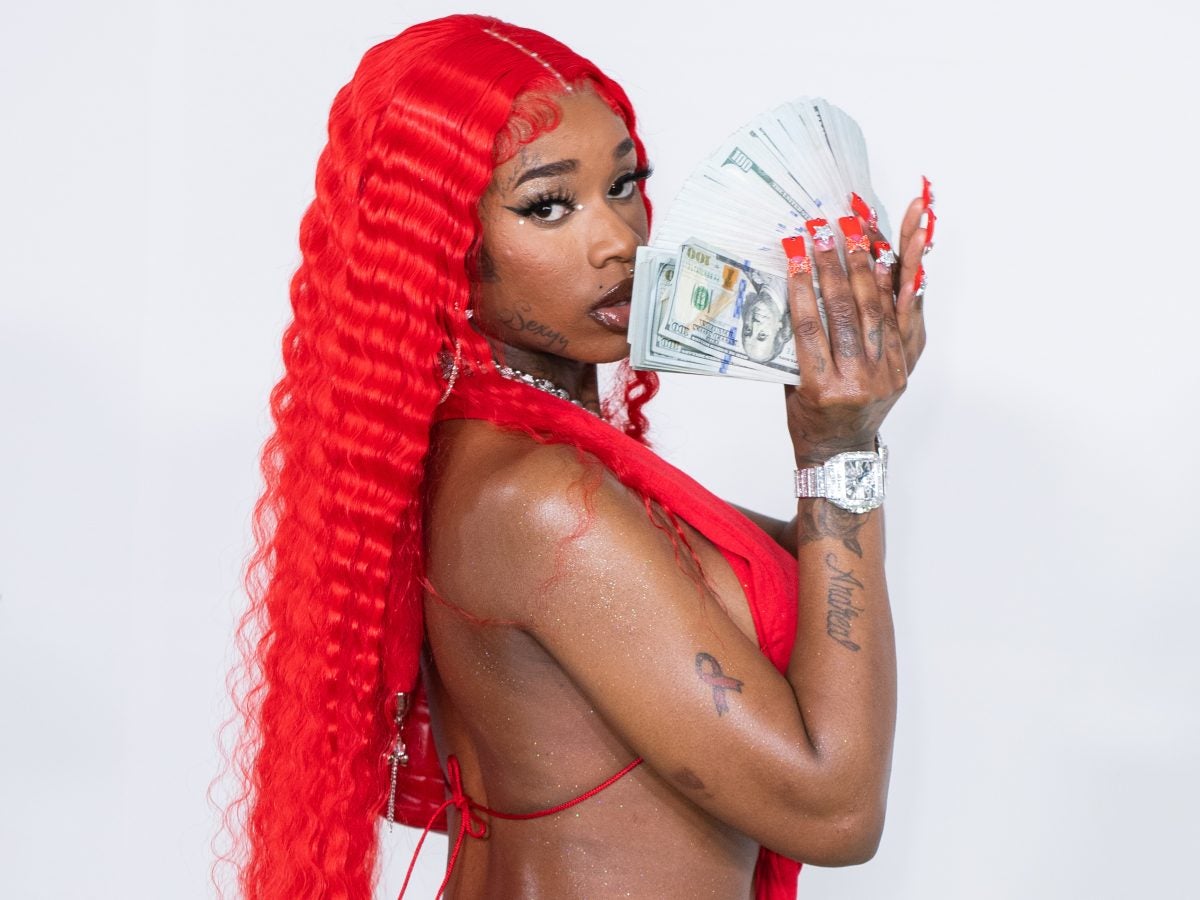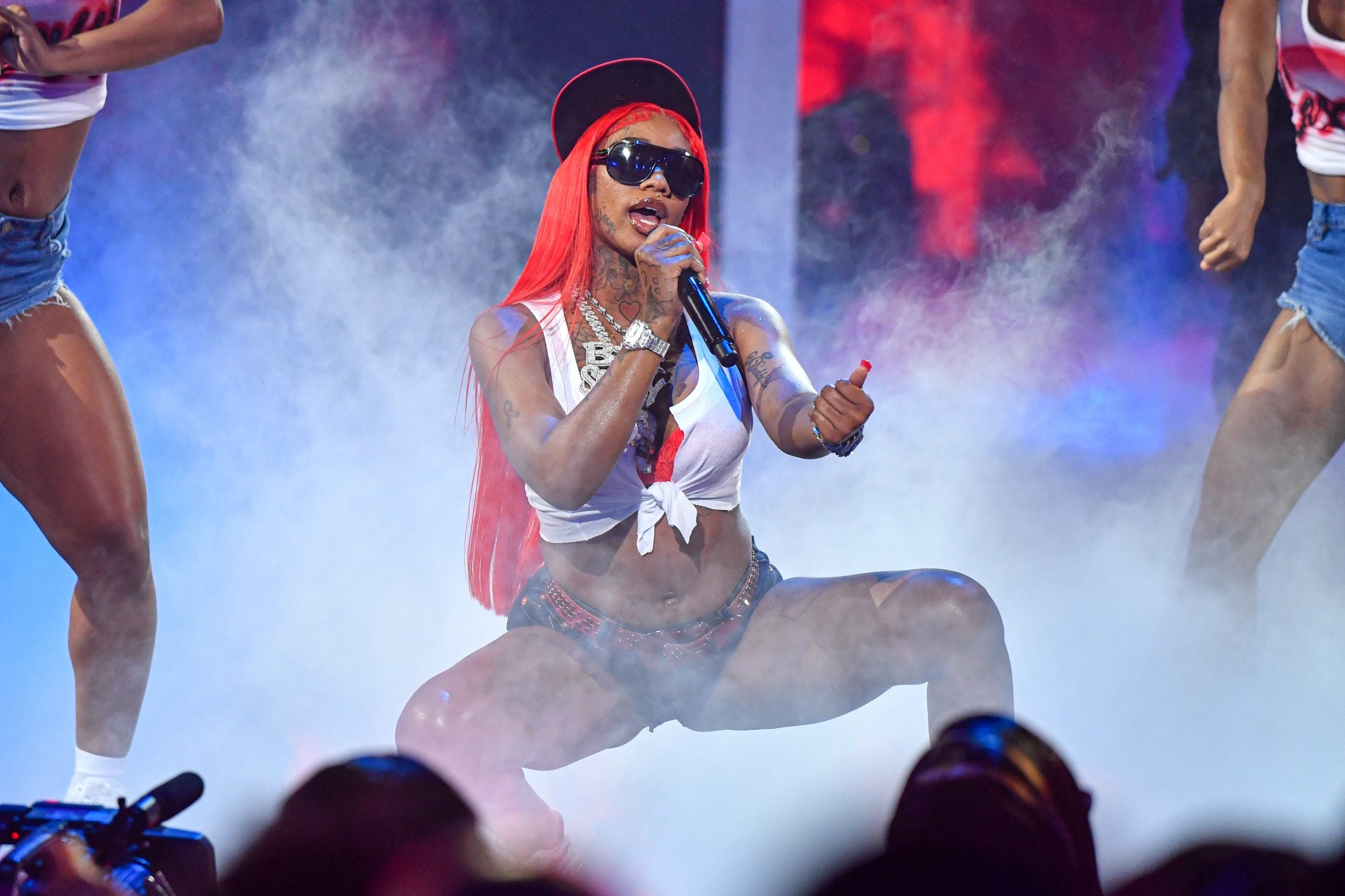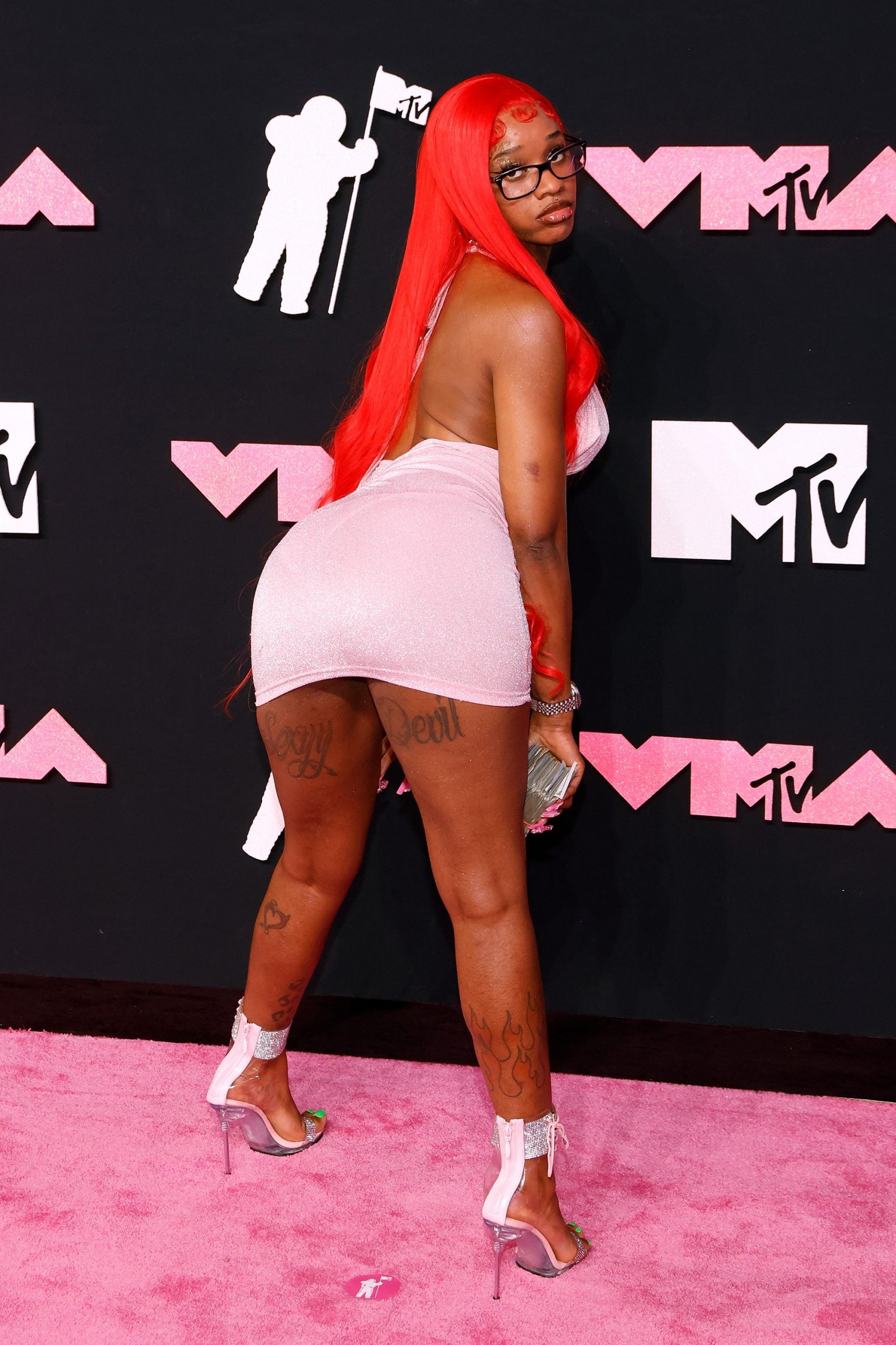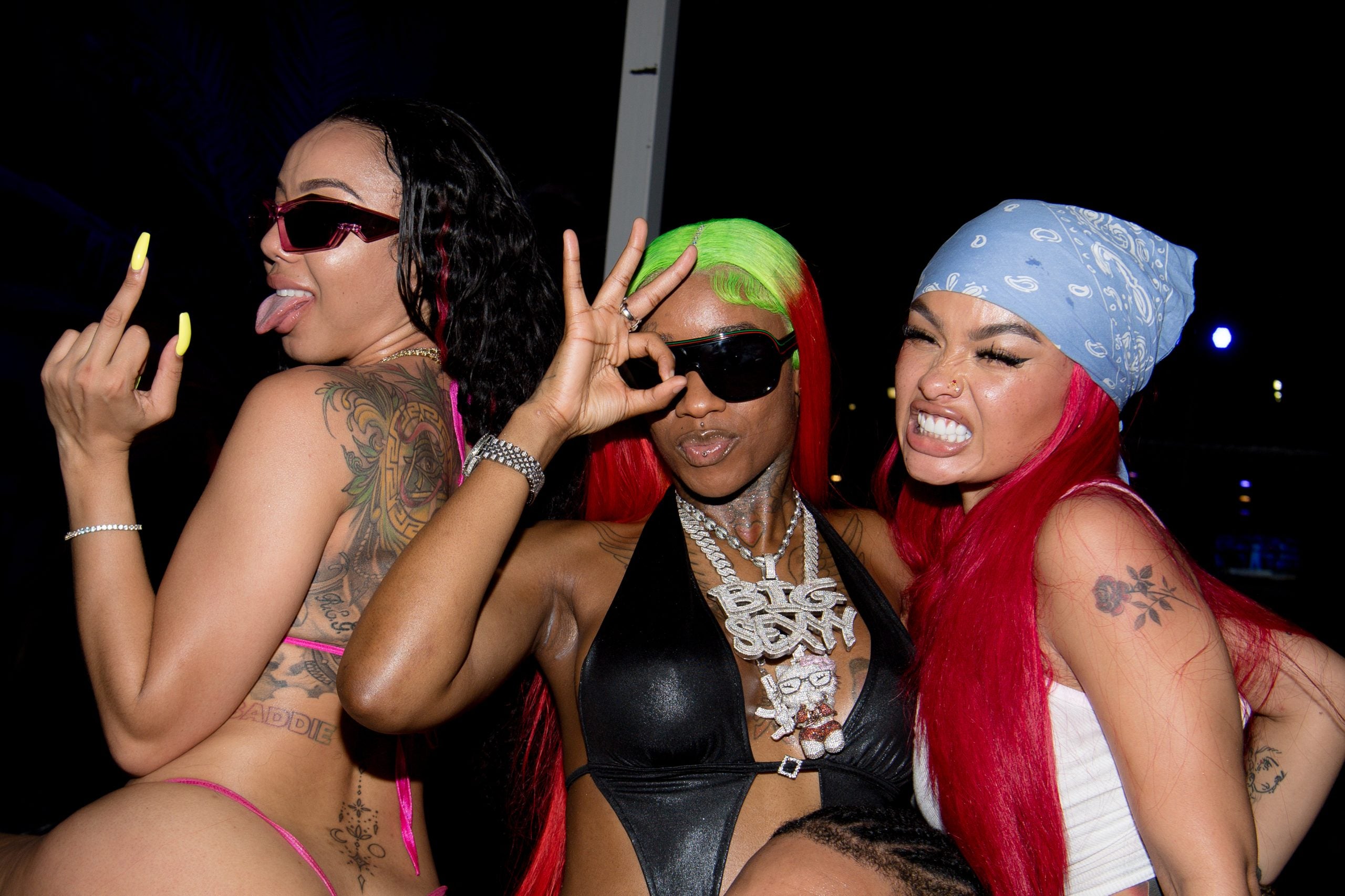
The first time I pressed play on a Sexyy Red song, I found myself laughing hysterically on the A Train at the sheer hilarity of it. It was uncouth. It was crass. It was indecorous. I delighted in every second of it. Then, I wondered:
Who is this young woman with these artistically raw tattoos, extravagantly expressive wigs, and decorative long nails who stays twerking with a blunt in her hand?
Janae Wherry, known professionally by the stage name Sexyy Red has an audacious, tattoo-covered aesthetic that is off-putting and jarring to some. The “Sexyy Devil” laminated on the back of her thighs. The stencil outline of diamonds inscribed on her abdomen. “Barbie” on left her thigh. Sexyy stamped on her behind. Sexyy, once again, in script on her jawline.
The Saint Louis, MO native also has both the names of her child and her city tattooed on her face. A breast cancer ribbon on her right arm; an ode to her grandmother who died of the disease. Her child’s father’s name is on her ankle. Her mother’s name on one arm and “Daddy” is on the other, in honor of her late stepfather, who she adored. Cheetah spots decorate her leg over healed scars from eczema. Matching tattoos with best friends for whom she’ll ride till the end.

A self-described “Ghetto Barbie” – two paradoxical words – Sexyy Red embodies both. Mattel’s Barbie represents an idealized beauty standard, reflecting and reinforcing societal standards of femininity, attractiveness, and body image. In tandem with the shift in societal trends, Barbie has been marketed over the decades to explore a myriad of professions, from lawyer to nurse, and even President, highlighting the potentiality of broadening women’s opportunities for actualization.
“Ghetto” (which Merriam Webster defines as “behaving in a low-class manner) speaks to the improvisatory brilliance that emerges when the circumstances beg for a practical solution. “Ghetto” shows up as putting lemonade into an empty Poland Spring bottle because you don’t have a S’well; preparing ramen noodles five different ways with veggies, meat, and different seasonings because you can’t afford anything else; drinking sugar and water when you’re really craving juice. It’s not appealing to some, but it’s a way of life for many.
For a young Black girl living in a poor neighborhood, society dictates that the canvas of reality on which you paint your dream is limited. With the appellation of “ghetto” to the concept of Barbie, the phrase now operates as acceptance that the paint supply is low, but she’ll still create a masterpiece. Sexyy Red embraces these two opposing words as an identity, creating a dialect of how we explore respectability, Black femininity, and ultimately, freedom.
The thing that terrifies people about her is also what they admire about her, and ultimately want for themselves. Sexyy Red knows who she is. She is self-governing and self-determining. As she said In an interview with The Breakfast Club, “I don’t live for other people. I do what I WANT to do… I’m happy, I love me.”

Her public persona stands in direct opposition to the concept of Black excellence. Michelle Obama is iconically quoted saying “When they go low, we go high.” Black excellence dictates that when met with adversity, we should always remain virtuous. We can only be magnificent. We can only be exceptional. We must conduct ourselves in a manner that presupposes respect.
Sexyy Red challenges the narrow confines of ‘Black excellence,’ a term often weaponized to enforce a monolithic standard of behavior that marginalizes the full spectrum of the Black experience. She is a personification of the “Hood B*tch” archetype and is trying to awaken the “Hood B*tch” in you as well.
I believe that as Black women, irrespective of class, we all have an “Inner Hood B*tch.” She has formed out of resistance to the white power structure, the patriarchy, and exploitation. She knows what she wants and loves how she looks – regardless of whether she meets mainstream society’s standards of conventional beauty. She stands ten toes down on “bidnis.” And when they go low, she drags it to hell.
Autonomous and relishing in self-adulation, Sexyy is her own biggest hype man.
“Slim thick, caramel skin / 5’5″, this bitch a ten (yeah)
Hair done, bills paid / Catch me slidin’ in a Benz (yoom)
I ain’t lookin’ for no man / Ain’t recruitin’ no new friends
Louis bag filled with bands / Go on, Sexyy, do your dance”
On her hit track “Get It Sexyy”, she affirms her beauty, commends herself for being able to take care of herself, upholds her community, and celebrates her wealth. She affirms that pleasure isn’t solely reserved for the elite.
A large part of Sexyy Red’s enchantment is her ostentatiously unrefined declaration of sexual desire. For many Black women growing up in sexually repressed environments, the idea of sex was presented as something to be performed to satisfy a man’s appetite. Society told us that women were objects of pleasure for men. Sexyy Red crudely refutes that.
“I just need some d***, I ain’t lookin’ for no love,” she brashly declares on her 2023 track “Nachos.” Throughout the song’s explicit lyrics, she not only deconstructs the idea that women can’t engage in sexual relations without falling in love, but she asserts exactly how she wants her temporary partner to please her. She is sovereign in her sexiness and her sexuality.
Sexyy Red’s existence in the industry is a testament to the glamorous musical sex icons that laid the foundation for her to soar. Lil Kim, Foxy Brown, Trina, Khia – and further back in history, Millie Jackson and Betty Davis. They spoke freely about their desires in an unfiltered and unadulterated manner. They were raw and riveting. They too, were ostracized and criticized in real time for their candor.
But perhaps the most special thing about Sexyy Red is that she is not special. She represents so many women from the hood everywhere. Her anthems speak to shared experiences and common struggles. Whether its “Bow Bow Bow (F My Baby Dad)” for women navigating a strained relationship with the father of their children, or “Sexyy Walk” for women struggling to find themselves alluring, her words are empowering and affirming. The reality is that a number of young women in socioeconomically marginalized areas are Sexyy Red.

The difference is she has a major platform on which to be as vulgar and crass in her truth as she pleases. She is the authentic hood girl that many rappers in her subsect attempt to cosplay when in actuality, that’s not who they are at all.
Sexyy Red expresses a form of Black femininity many of us detest acknowledging because she isn’t “respectable.” A self-described “troll,” she speaks frankly and openly about experiencing vaginal odor and venereal infections. She’s gang-affiliated. She posts photos wielding guns with her baby daddy. None of it negates the fact that she is a real person, especially recognizable to people who grew up in economically deprived areas.
Her biggest critics likely wish they could be as free as her. Sexyy Red is authentically herself at all times. She isn’t a slave to the system nor daunted by societal slander. While I do believe there is a tacit agenda to keep the Black community disorganized and immobilized, we must still acknowledge that her presence commands engagement and respect.
Sexyy Red exists, she thrives, and her music resonates across socioeconomic classes. She actively embraces the Inner Hood B*tch. She lives in radical honestly. She’s not looking to be liked. She’s about her coin and seizing her moment. And that moment is now. SKEEYEE!